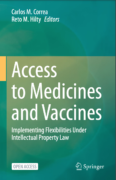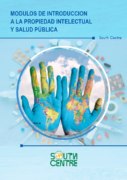Parallel Imports
Utilising Public Health Flexibilities in the Era of COVID-19: An Analysis of Intellectual Property Regulation in the OAPI and MENA Regions
By Yousuf A Vawda and Bonginkosi Shozi
The paper explores the unique approaches to IP protection in the countries belonging to the Organisation Africaine de la Propriété Intellectuelle/African Intellectual Property Organization (OAPI) and the Middle East and North Africa (MENA) regions; the limited extent to which legal and policy frameworks with regard to TRIPS flexibilities have been adopted and implemented in pursuit of access to medicines in those countries; and makes recommendations in order to optimise the use of the flexibilities in advancing public health objectives. In the context of the COVID-19 pandemic, the impact of IP rights on access, and some approaches to countering the challenges to access are also discussed.
(more…)
Access to Medicines and Vaccines: Implementing Flexibilities Under Intellectual Property Law
 Description:
Description:
This book is an outcome of a partnership between the Max Planck Institute (MPI) for Innovation and Competition and the South Centre, which jointly organized a Global Forum on Intellectual Property, Access to Medicine and Innovation in Munich on 9– 10 December 2019.
This book examines topics of particular relevance for shaping intellectual property regimes that take into account public health concerns. It provides not only deep analyses but options for the interpretation of existing regulations or the adoption of new legislation that, being consistent with the TRIPS Agreement, can allow the judiciary and policy makers to take such concerns into account. In different chapters, the book addresses various dimensions of the flexibilities allowed under the TRIPS Agreement. Although there is a significant literature and statements on the subject, such as the ‘Declaration on Patent Protection. Regulatory Sovereignty under TRIPS’ elaborated under the auspices of the MPI, the book contains new reflections and examines recent developments in case law and legislation.
The covered issues include how the TRIPS Agreement can be interpreted to implement its flexibilities, the use of competition law to promote access to medicines, the role of cooperation in the examination of patent applications, patentability requirements, the impact of TRIPS plus provisions (such as the linkage between patents and drug regulatory approvals), the patentability in the area of CRISPR genome editing technologies, as well as an analysis of the scope of exceptions and limitations to exclusive rights provided for by the Agreement, such as the exhaustion of rights and parallel imports, compulsory licenses, the ‘Bolar exemption’, and procedural mechanisms like pre-grant oppositions. The implications of the protection of test data are also examined.
While celebrating the opportunity of working together in organizing the Global Forum, we hope that this book will assist policy makers and judges and provide new inputs for academic research. While, as mentioned, there is a differentiated impact of intellectual property rights depending on the level of development of the country where it applies, the reconciliation of such rights with public health interests, particularly in relation to access to medicines, is a matter of concern for all countries.
Editors: Carlos M. Correa and Reto M. Hilty
(more…)
Propiedad intelectual y acceso a medicamentos: una introducción a cuestiones clave – algunos términos y conceptos básicos
Por Germán Velásquez
La propiedad intelectual y las patentes en particular se han convertido en uno de los temas más debatidos sobre el acceso a los medicamentos, desde la creación de la Organización Mundial del Comercio (OMC) y la entrada en vigor del Acuerdo sobre los Aspectos de los Derechos de Propiedad Intelectual relacionados con el Comercio (ADPIC). Las patentes no son de ninguna manera las únicas barreras para el acceso a medicamentos que salvan vidas, pero pueden desempeñar un papel significativo, o incluso determinante. Durante el período de protección de la patente, la capacidad del titular de la patente para determinar los precios, en ausencia de competencia, puede hacer que el medicamento resulte inalcanzable para la mayoría de las personas que viven en los países en desarrollo. Este primer número de los “Materiales de capacitación del South Centre” pretende, en su primera parte, ofrecer una introducción a cuestiones clave en el ámbito del acceso a los medicamentos y la propiedad intelectual. La segunda parte describe y define algunos términos y conceptos básicos de esta área relativamente nueva de las políticas farmacéuticas, que son los aspectos comerciales de los derechos de propiedad intelectual que regulan la investigación, el desarrollo y el suministro de medicamentos y las tecnologías sanitarias en general.
(more…)
Expanding the production of COVID-19 vaccines to reach developing countries
Lift the barriers to fight the pandemic in the Global South
By Carlos M. Correa
The unfolding of COVID-19 has shown that the international system has been unable to ensure equal access to the vaccines and other products necessary to fight the pandemic. While the need for a strong response remains obvious, proposals for scaling up the production of COVID-19 vaccines across the globe are still blocked in the World Trade Organization.
(more…)
Propriété Intellectuelle et Accès aux Médicaments : Une Introduction aux Grandes Problématiques – Quelques Termes et Concepts de Base
Par Germán Velásquez
La propriété intellectuelle et les brevets en particulier sont devenus l’une des questions les plus débattues sur l’accès aux médicaments, depuis la création de l’Organisation mondiale du commerce (OMC) et l’entrée en vigueur de l’Accord sur les aspects des droits de propriété intellectuelle qui touchent au commerce (ADPIC). Les brevets ne sont nullement les seuls obstacles à l’accès aux médicaments qui sauvent des vies, mais ils peuvent jouer un rôle important, voire déterminant. Pendant la durée de protection d’un brevet, la capacité du titulaire du brevet à déterminer les prix, en l’absence de concurrence, peut faire en sorte que le médicament soit inabordable pour la majorité des personnes vivant dans les pays en développement. Ce premier numéro du “South Centre Training Papers” vise, dans sa première partie, à fournir une introduction aux questions clés dans le domaine de l’accès aux médicaments et de la propriété intellectuelle. La deuxième partie décrit et définit certains termes et concepts de base de ce domaine relativement nouveau des politiques pharmaceutiques, qui sont les aspects liés au commerce des droits de propriété intellectuelle qui régissent la recherche, le développement et la fourniture de médicaments et les technologies de la santé en général.
(more…)
Modulos de Introduccion a la Propiedad Intelectual y Salud Pública

Descripción:
Este libro contiene cuatro módulos para la capacitación en materia de propiedad intelectual y salud pública. Su objetivo es presentar una introducción a las diversas categorías de derechos de propiedad intelectual y, en particular, ilustrar sobre los derechos aplicables a la producción y comercialización de medicamentos en el marco de las llamadas ‘flexibilidades’ contenidas en el Acuerdo sobre los Aspectos de los Derechos de Propiedad Intelectual relacionados con el Comercio de la Organización Mundial del Comercio. Los módulos proporcionan elementos para comprender el alcance y las implicaciones de los derechos de propiedad intelectual, especialmente las patentes de invención, en el acceso a los medicamentos. Ellos brindan asimismo pautas para el diseño y la aplicación de esos derechos en una manera consistente con dicho Acuerdo y con políticas de protección de la salud pública. Los módulos contienen información general y enfoques prácticos para orientar a los encargados de formular y aplicar políticas públicas en el tratamiento del tema, tanto en el campo administrativo como judicial.
(more…)
Eighteen Years After Doha: An Analysis of the Use of Public Health TRIPS Flexibilities in Africa
By Yousuf A Vawda and Bonginkosi Shozi
As we observe the 18th anniversary of the Doha Declaration on the TRIPS Agreement (Agreement on Trade-Related Aspects of Intellectual Property Rights) and Public Health, it is appropriate to take stock of intellectual property developments and endeavour to present a comprehensive account of the situation in the African continent in respect of the implementation of TRIPS flexibilities, specifically those regarding access to medicines. This research paper provides an overview of the extent to which selected African countries have adopted legal and policy frameworks with regard to TRIPS flexibilities, examines the actual use of these flexibilities in enabling access to medicines in those countries, and suggests some recommendations for optimising the use of the flexibilities in pursuing public health imperatives.
(more…)
Intellectual Property and Access to Medicines: An Introduction to Key Issues – Some Basic Terms and Concepts
Intellectual property and patents in particular, have become one of the most debated issues on access to medicines, since the creation of the World Trade Organization (WTO) and the coming into force of the Agreement on Trade-Related Aspects of Intellectual Property Rights (TRIPS). Patents are by no means the only barriers to access to life-saving medicines, but they can play a significant, or even determinant, role. During the term of patent protection, the patent holder’s ability to determine prices, in the absence of competition, can result in the medicine being unaffordable to the majority of people living in developing countries. This first issue of the “South Centre Training Materials” aims, in its first part, to provide an introduction to key issues in the field of access to medicines and intellectual property. The second part describes and defines some basic terms and concepts of this relatively new area of pharmaceuticals policies which are the trade related aspects of intellectual property rights that regulate the research, development and supply of medicines and health technologies in general.
(more…)
How Developing Countries Can Manage Intellectual Property Rights to Maximize Access to Knowledge
This book addresses the debate on access to knowledge in three parts. Part I describes some of the challenges for access to knowledge. Part II of the book provides an account of recent developments in multilateral forums. Part III of the book seeks to advance the strategic considerations that should be useful to developing countries in addressing the challenges with regard to access to knowledge. It is hoped that the analysis, conclusions and recommendations presented in this book will contribute to a better understanding of the challenges to access to knowledge and of how to frame development-oriented policies to address them. The book is intended to reach a broad set of readers: it provides guidelines for developing countries’ governments in participating in multilateral and bilateral negotiations as well as to design national IP regimes consistent with those countries’ development objectives. It may also be of value to scholars, teachers, and students whose interests cover such areas as law, economics, political economy, diplomacy, international relations and other social science fields.
Download Book













 Description:
Description: